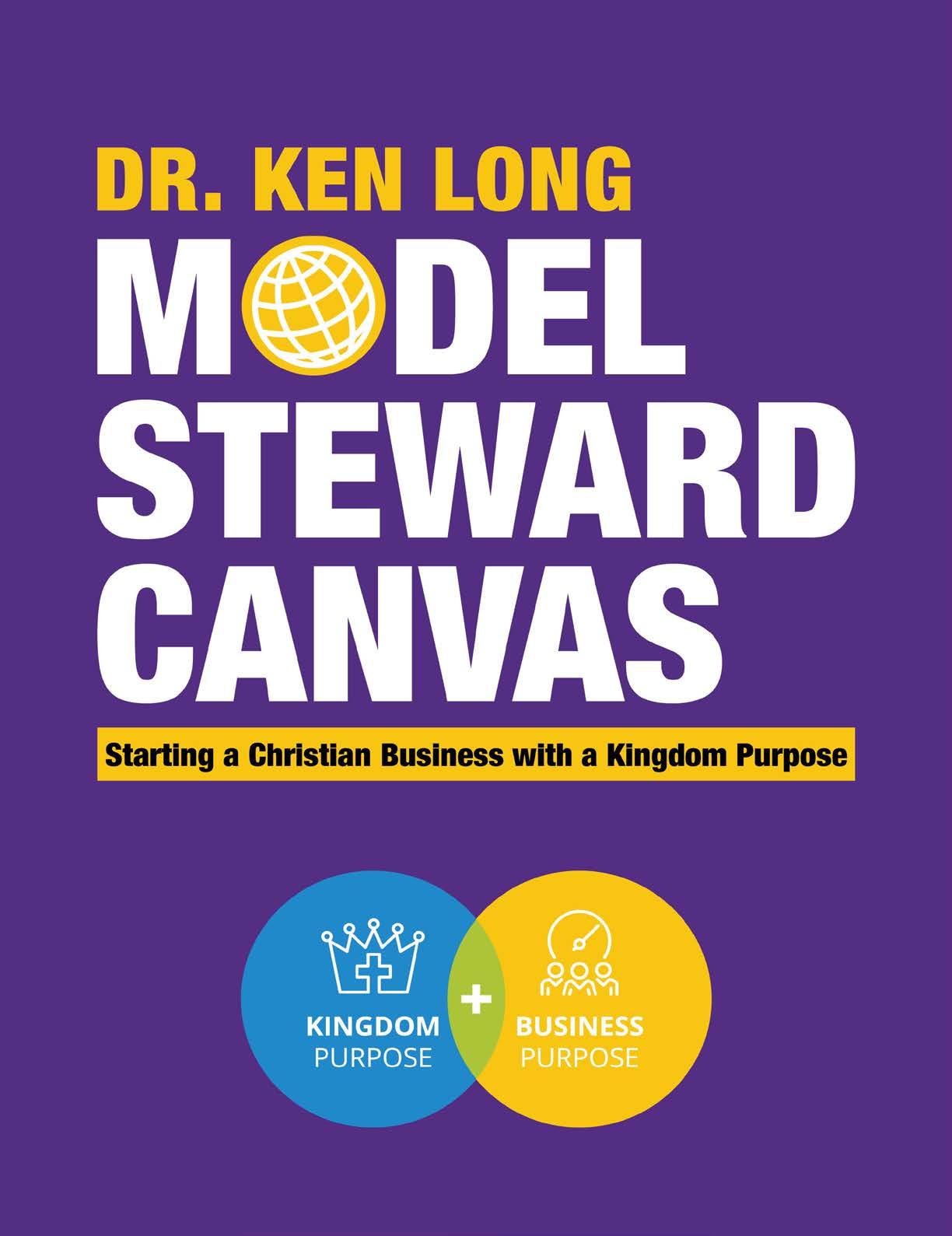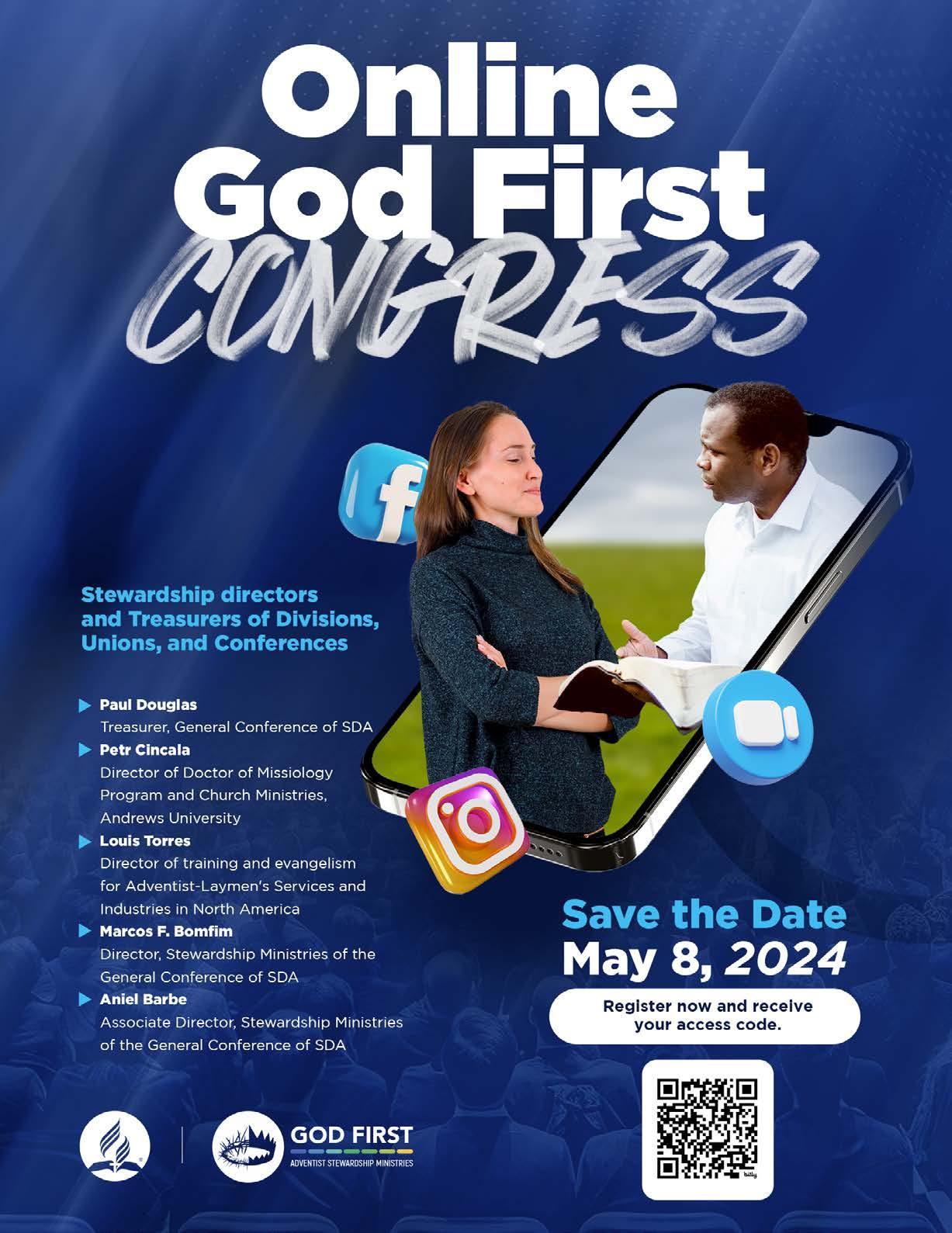
SELF-RELIANCE in HIM
stewardship.adventist.org JANUARY-MARCH 2024 VOL. 27. NO.1
Barnabas and the New Ministers of the Storehouse
P. 4 / DEMÓSTENES NEVES DA SILVA
Financial Spiritual Giving and Privacy Concerns
P. 8 / MARCOS F. BOMFIM
My journey to Self-Reliance
P. 11/ DORCAS WELLIO
Brief Conversation on Self-Reliance
P. 14/ WILLIAM BAGAMBE
Catch Them Young
P. 15 / WILLIE CHINYAMURINDI
The
P.





ADDITIONAL
CONTRIBUTING EDITORS
ECD Edison Nsengiyumva
ESD Vadim Grinenko
IAD Roberto Herrera
NAD Michael Harpe
NSD NakHyung Kim
SAD Josanan Alves, Jr.
SID Mundia Liywalii
SPD Julian Archer
SSD Jibil Simbah
SUD Sunderraj Paulmoney
TED Heli Otamo-Csizmadia
WAD Paul Sampah
MENA Amir Ghali
IF Julio Mendez
CHUM Steve Rose
Ukraine Konstantin Kampen
PERMISSIONS
The Dynamic Steward grants permission for any article (not a reprint) to be printed, for use in a local church setting such as a small group, Sabbath School, or classroom. The following credit must be given: Used by permission of the Dynamic Steward. Copyright © 2024. Written permission must be obtained for any other use.
EDITOR'S NOTE
The articles in this publication have been revised for the intended audience and nature of the Dynamic Steward. Unless otherwise stated, the New International Version of the Bible is used.
DISCLAIMER
The content or opinions expressed, implied, or included in or with any recommended resources are solely those of the authors and not those of the publishers of the Dynamic Steward. The publishers do, however, advocate these resources on the basis of their rich contributions to the area of stewardship ministry, and assume that readers will apply their own critical evaluations as they make use of them.
The DYNAMIC STEWARD is published quarterly by the Stewardship Ministries of the General Conference of Seventh-day Adventists.®
DIRECTOR: Marcos Bomfim
ASSOCIATE DIRECTOR: Aniel Barbe
SENIOR EDITORIAL ASSISTANT:
Johnetta B. Flomo
DYNAMIC STEWARD
EDITOR:
Aniel Barbe BarbeA@gc.adventist.org
ASSISTANT EDITOR :
Johnetta B. Flomo FlomoJ@gc.adventist.org
EDITORIAL ASSISTANT:
Megan Mason
LAYOUT & DESIGN:
Gerard Lam Hing info@180.social www.180.social.
Contact us: 12501 Old Columbia Pike Silver Spring, MD 20904 USA
Tel: +1 301-680-6157
gcstewardship@gc.adventist.org
www.facebook.com/GCStewardshipMinistries
www.issuu.com/Dynamicsteward
GOD FIRST 2 January-March 2024 https://stewardship.adventist.org/ BIBLE CREDITS: Unless otherwise indicated, all Scripture quotations credited to NIV are taken from to NIV are from the Holy Bible, New International Version. Copyright © 1973, 1978, 1984, 2011 by Biblica, Inc. Used by permission. All rights reserved worldwide. Scripture marked KJV is taken from New King James Version®. Copyright © 1982 by Thomas Nelson. Used by permission. All rights reserved. Scripture marked NKJV is taken from the New King James Version®. Copyright © 1982 by Thomas Nelson. Used by permission. All rights reserved. Scripture marked MSG are taken from The Message, copyright © 1993, 2002, 2018 by Eugene H. Peterson. Used by permission of NavPress Publishing Group. Represented by Tyndale House Publishers, Inc.Scripture marked ESV is taken from the Holy Bible, English Standard Version. ESV® Text Edition: 2016. Copyright © 2001 by Crossway Bibles, a publishing ministry of Good News Publishers.
04 11 17 Cover photo:: X) / Unsplash
08
Foundations of Self-Reliance
A Financial Biography Teen Years–Young Adult (Part 2)
21 / DENNIS CARLSON
17 / KEN LONG
PP.
FOLLOWING CHRIST’S METHOD
How can we improve our approach to stewardship education within our local churches? Allow me to remind you of a familiar answer, one you have probably heard in a different context: Follow Christ’s method. This answer is regularly supported by a well-known citation: “Christ’s method alone will give true success in reaching the people. The Savior mingled with people as one who desired their good. He showed His sympathy for them, ministered to their needs, and won their confidence. Then He bade them, ‘Follow Me.’¹
Beyond its relevance for evangelism, this passage provides insights applicable for us to grow our influence to “spur one another on toward love and good deeds” (Hebrews 10:24, NIV). How can we apply the admonition “attend to their needs” to the process of nurturing faithful stewards?
The Three-Legged Strategy
Historically, stewardship education has primarily, in some places exclusively, focused on influencing members to support God’s mission through their financial resources. The emphasis on tithing, offerings, and gifts is central to this approach. Alternatively, some efforts have excelled in using a promotional approach, appealing to members’ compassion and showcasing narratives of mission successes. While I recognize the substantial results obtained through these methods, I believe that expanding to “attend to their needs” can produce even greater outcomes.
“Attend to their needs” can be achieved through a shift toward a more comprehensive approach to stewardship education. Concretely, this entails teaching members about managing and generating personal finances, alongside instructions on system-
atic giving. The inspired writer describes an alarming situation prevailing in the ranks of God’s people: “Many lack wise management and economy. They do not weigh matters well and move cautiously.
When the church becomes a facilitator in the management and creation of resources, it creates a unique dynamic favorable to members’ giving
Such should not trust to their own poor judgment, but counsel with their brethren who have experience.”² A recent study about financial literacy, including managing and generating finances, shows that there is a dire need for financial education among some populations³. What if each local church could serve as a hub where people can learn about quality living, in its full dimensions?
Impact on God’s Mission
You can visualize how this abovementioned strategy can bring growth to the support of God’s mission. It’s often believed that more personal resources lead to more giving. While this statement is true in many instances, it does not always happen this way. Research suggests that an increase in income does not always translate to a higher percentage given as congregational giving.⁴ However, when the church becomes a facilitator in the management and creation of resources, it creates a unique dynamic favorable to members’ giv-
ing through the church.
A local church pastor recently explained the connection to me: “When a member realizes that you are not only interested in the money that they give to the church but in their welfare, then they also return. When they benefit from what you have taught them, they reciprocate by giving back to the church or through the pastor, because he has helped them to attain this kind of life.” The principle highlighted here is one of reciprocity and gratitude. As the church helps improve the economic condition of members, they become more open to receive stewardship instructions and give back to the church.
Our invitation for all to follow the Master Steward will resonante more deeply in the hearts of our church members when we attend to existing needs. This reality explains the focus of this number of Dynamic Steward on Self-Reliance.
1. Ellen G. White, Ministry of Healing (Mountain View, CA: Pacific Press Pub. Assn., 1905), 143
2. Ellen G. White, Welfare Ministry (Washington, D.C.: Review and Herald Pub. Assn., 1952), 201.
3. Annamaria Lusardi. “Financial Literacy and the Need for Financial Education: Evidence and Implications,” Swiss Journal of Economics and Statistics 155, no. 1 (2019), https://doi.org/10.1186/s41937-019-0027-5.
4. Christian Smith, Michael O. Emerson, and Patricia Snell, Passing the Plate: Why American Christians Don’t Give Away More Money (Oxford: Oxford University Press, 2008).

Pastor Aniel Barbe is an associate director of Stewardship Ministries and editor of Dynamic Steward at the General Conference of Seventh-day Adventists, Silver Spring, Maryland.
3 January-March 2024 www.stewardship.adventist.org
editorial
Barnabas and the New Ministers of the

In the Old Testament, the tithe and some special offerings belonged, respectively, to the Levites and the priests of the family of Aaron. These offerings were also called “holy” or kodesh (Numbers 18).
In addition to freewill offerings, animals, houses, and fields could also be consecrated (Leviticus 27:1–28), becoming holy and, in due course, should be given to the storehouse (Malachi 3:8–10). Once promised, they could no longer be used by the owner at his discretion, for they were holy and belonged to the Lord.
Therefore, consecrated things were as holy (kodesh) as the tithe. There was, however, an important difference: to be holy (kodesh), tithing was not dependent on a desire or promise on the part of the worshiper. Tithing, like the Sabbath (Exodus 20:8–11), was previously holy by divine appointment (Leviticus 27:30, 32).
In this article, we will approach the system of the storehouse as the receiving center of the holy things, with the Levites and the priests as managers. We also emphasize the move to the new ministry and the new storehouse indicated particularly in Acts 4:34–37 in the example of Barnabas, a Levite converted to the faith in the Lord Jesus.
The Storehouse in the Old Testament
In the Bible, the holy things, their trustees, and the storehouse are integrated into a God-appointed administrative system
(Leviticus 27:8–33; Numbers 18; Malachi 3:8–10). In this context, it was the right of the Levite and the priest (kohen, Levite of the family of Aaron) to be maintained by holy things—an indication of the legitimacy of their ministry and mission as guardians of the storehouse.
A Levite was entitled to a greater portion of the tithe (Numbers 18:21–24), and the priests were entitled to a part of the tithe and certain consecrated offerings (Numbers 18:7–20, 26–28). Among these holy things, already mentioned above, were fields and houses (Leviticus 27:14–23).
It is important to remember that the tithe would be levied (2 Chronicles 31:6) on the consecrated things (kodesh) and their proceeds. The same occurred with unconsecrated property (Leviticus 27:30–33). In addition, when sold, the entire value of the consecrated property should be given to the treasury. But if the owner who consecrated it wanted the property back, he should pay the value of the property stipulated in the priest's valuation, and add twenty percent to the value given by the kohen (Leviticus 27:19). It was the same practice with the tithe (verse 31).
In this sense, consecrated things were treated similarly to the tithe, that is, the owner could not withhold them in whole or in part, which reminds us of the sin of Ananias and Sapphira (Acts 5:1–4), who withheld a portion of what was promised.
The fact that the Levites and priests were chosen as depositaries of the tithes, as well as the offerings and the consecrated things that were given to God, made them guardians of the system established by God and, therefore, they should be considered as His representatives. Giving to the priest was the same as giving to God, something that is very clear in the Bible (see Leviticus 2:1, 2, 8; 5:7, 8; 7:35; 23:10, 11; Numbers 18:28). Thus, not bringing the tithes and offerings into the treasury (storehouse), which was administered by God's representatives, was equated with robbing God (Malachi 3:8–10).
On the other hand, the faithful giving of tithes, offerings, and things consecrated to the storehouse is connected to the idea of spiritual revival in several biblical examples (1 Chronicles 29:1–20; 2 Chronicles 31:1–21; Nehemiah 10:32–39; 13:913; Malachi 3:7–10).
Holy Things and the Pentecost
In the revival experienced during Pentecost (Acts 2:1–4; see also chapters 4 and 5), faithfulness and generosity were an integral part of the giving of consecrated things. The negative example of Ananias and Sapphira, who did not fulfill their vow and tried to cover up their sin with a lie, is a clear divine rebuke to greed.
In this passage of Acts, there is also a new fact regarding the destination of things consecrated to the Lord. Whereas in
4 January-March 2024 Dynamic Steward Getty Images
Demóstenes Neves da Silva
the Storehouse

the Old Testament consecrated property was brought to the Levites (see Leviticus 27:14–23), in this account of the book of Acts, converts sold their property and placed the entire proceeds of the sale at the apostles' feet (Acts 4:34, 35).
After being dedicated to God, these resources were considered holy. However, instead of being taken to the temple, to the Levites, and the kohen, they were placed “at the feet,” that is, under the coordination of the apostles, to meet the needs of the believers (and obviously of the ministers) during the crisis the community was facing.
The episode of Ananias and Sapphira suggests that this gift was more than a mere occasional offering or an ordinary spontaneous contribution to charity. The account makes more sense in the biblical context of the daily life of the Jewish temple, in which the holy thing concept was very present, as reported in Leviticus 27. The couple of Acts 5 had promised to make their donation in full, thus making the field kodesh—holy to the Lord. But at the time of handing it over, they just pretended to be giving everything, even though they were withholding a part of it. Then the Spirit revealed to the apostle that the kodesh was being violated, as they were lying with the intention of not giving it in full. As Ellen G. White well observes: “Ananias and Sapphira had made a pledge to give to the Lord the proceeds from
the sale of certain property” (Acts of the Apostles, 71). White also states: “When the heart is stirred by the influence of the Holy Spirit, and a vow is made to give a certain amount, the one who vows has no longer any right to the consecrated portion” (Acts of the Apostles, 74). But Ananias and Sapphira “talked the matter over, and decided not to fulfill their pledge” (White, Acts of the Apostles, 72).
Although the amount of the sale was not yet defined, the total value that would be obtained for the field had to be given to the church, because the property was now a holy thing (kodesh).
The account does not record Ananias stating that the offer was equal to the full value of the property. Therefore, the condemnation by the apostle stemmed from a revelation of the Spirit, which required that Ananias' statement was true to what was promised in the couple's vow, which caused the property to become kodesh. They would have avoided sin if they had only promised a portion of the field (Leviticus 27:16).
According to the law, as mentioned above, holy things were also to be tithed (2 Chronicles 31:6). Thus, when properties were sold, the entire amount was taken to the apostles, which indicates that the tithe was also handled at that time.
Furthermore, as the Bible indicates, the tithe was designed for the support of
the Levites and the kohen (who received the tithe of the tithe), but they were not the owners. Centuries before the Levites existed, the tithe had already been given to support the order of Melchizedek (Genesis 14:18–20), the same Melchizedek who, later on, would represent Jesus, the living Eternal Priest, in His non-Leviticus ministry (Hebrews 7:1–10). Jesus is the true owner of tithes and offerings, and at different times He gives them to whomever He wants for the support of His ministers and the work of preaching the gospel to all the nations (Matthew 28:19).
The Testimony of Barnabas
Having understood this, still in the context of the effects of the work of the Holy Spirit in Acts 2, Luke made a point of also mentioning another donation, as he identifies an emblematic donor—Barnabas. Why did Luke mention Barnabas among so many others who had already sold their lands and houses and consecrated them to the Lord (see Acts 4:34–37)?
Barnabas, a Levite acquainted with the law, had the duty of leading people to the truth (Malachi 2:4–7). Therefore, he set aside the dying Levitical tradition—which had already fulfilled its role—and, led by the power of the Holy Spirit, he accepted the appointment of a new ministry (Acts 13:2, 3).
Barnabas understood that the
5 January-March 2024 www.stewardship.adventist.org
original divine mission which Israel had neglected was to bring the blessing of Abraham not only to Jews but to the whole world (Acts 13:46, 47). Thus, as Luke recorded the emblematic offering of the Levite Barnabas, he reinforces the new orientation indicated by the Holy Spirit practiced by Jews and Gentiles converted to Judaism. Now they "brought the proceeds of the things that were sold, and laid them at the apostles’ feet” (Acts 4:34, 35, NKJV). By the Spirit, the apostles, instead of the Levites, came to be recognized as the new depositaries of the holy offerings (kodesh) due to the Lord (which included tithes and offerings).
A new ministry had emerged. The first one had been the order of Melchizedek, centuries before the Levites. The second, the ministry of the Levites and the kohen in the Israelite nation, while the temple functioned. The third, as we have seen in the biblical historical succession, is the ministry of the apostles and the ultimate, most sublime ministry of Jesus Himself, the Word, the High Priest, the true Kohen (Hebrews 8:1, 2).
By his example, the Levite Barnabas recognizes that the apostles are God’s new ministers. They represent Him and also the church, which is His body. Moved by the Holy Spirit, Barnabas recognizes that his ministerial right had changed hands.
Instead of requesting from the Levitical system the proceeds of the sale of land and houses, that is, the consecrated things (Leviticus 27:14–23), and of the tithe (Leviticus 27:30-33; Matthew 23:23), he acknowledges that the right to holy things now belongs to the church and its Spiritappointed leadership. Thus, the Levite laid the total proceeds of the sale of the field that he had consecrated to the Lord at the feet of the apostles, who were not Levites and did not have the legal function of kohen.
Instead of leading everyone toward the temple, which was previously the recipient of consecrated gifts, Barnabas bows and recognizes in the apostles
the new and legitimate ministry of the storehouse, who succeeds the Levites as they succeeded the physical priestly order of Melchizedek.
In this way, indicates the Holy Spirit, the Lord transferred to the church (represented by its leadership) not only the right to receive the gifts (now conferred to the new storehouse) but also the duty to preach the Gospel to the whole world, a duty which had been neglected by the Israelite nation.
The Temple ceases, but the Gospel continues on.
And as a concrete sign that the Levitical ministry had ended, the Lord definitively took away their temple and dispersed the Levitical and kohen lineage. The torn veil of the sanctuary (Matthews 27:51) also indicated that the Levitical ministry had come to an end, which is later ratified by the destruction of the temple. As a people, the Israelites rejected the Lord, the True Priest, and so the ministry passed into other hands. As examples of this change, the Bible says that God's people are the church built by Jesus (Matthews 16:18); that salvation (Abraham's blessing) to all nations is preached by the church (Matthews 28:19, 20); and that, according to the Spirit, power and holy things have been given to the church (Acts 2; 4:34–37). It was the Spirit that moved many who owned lands or houses to sell them and “[bring] the proceeds of the things that were sold” (Acts 4:34, NKJV).
Why does the author of Acts identify Barnabas, pointing out the fact that, even though he was a Levite, he also sold a field, and “brought the money and laid it
at the apostles’ feet” (Acts 4:37, NKJV)?
This mention cannot be accidental. A new ministry had been inaugurated, no longer based on the Levitical lineage and the Aaronic priesthood, but on the apostles, the ministers of the church of Jesus, at whose feet the gifts and holy things hereafter were to be placed both by Jews and Gentiles.
Since Barnabas was a Levite, his example is an endorsement of the church's right to receive, in place of the priests, the tithes and offerings of the old Levitical system in order to support the ministry and the preaching of the gospel.
Conclusion
The system of the Levites has ceased; the temple is no more. God gives the tithe and the holy offerings, kodesh, to whomever He wants, as the Bible indicates.
Jesus, our Priest, is alive and is entitled to tithes and offerings (Hebrews 7:1–8). For a while, He gave the tithe to the order of Melchizedek. Later on, He gave it, along with the offerings, to the Levitical system, whose temple was only a copy of the model (Exodus 25:9, 40; 26:30) and a shadow of the gospel (Hebrews 10:1–10). But now, finally, He has given that right to the church that preaches the everlasting gospel of salvation by faith in Jesus (Revelation 14:6–12).
The true ministry is that of Jesus (Hebrews 7:1–12), and His ministers now are those who exclusively serve Him through their ministry and preaching. That’s why the right of the altar and the ancient temple belongs to the ministers of the gospel
(1 Corinthians 9:13, 14). Barnabas, who was a Levite, lays his own offering at the feet of the apostles (Acts 4:36, 37), for the care of church leadership. A brand-new storehouse is thus established for the new ministers of Jesus' church (Ephesians 4:10, 11; 1 Corinthians 4:1, 2).

Dr. Demóstenes Neves da Silva (Doctor in Psychology, Master in Family and Theology) retired in 2018 as a professor at Faculdade Adventista da Bahia, Brazil.
6 January-March 2024 Dynamic Steward

FINANCIAL SPIRITUAL & PRIVACY CONCERNS GIVING

In a time in which privacy concerns have become increasingly important, should pastors receive privileged information from treasurers about their members’ Financial Spiritual Giving1 patterns? Should pastors check potential leaders’ giving patterns before their names are brought under consideration by the nominating committee, as recommended by the Seventh-Day Adventist Church Manual? Should leaders of the church be expected to regularly tithe as a requirement to hold church office?
The Nature of Financial Spiritual Giving
Financial Spiritual Giving is a reliable indicator of where one's heart (affections) is placed and the direction one's life takes. It also strengthens the spiritual life of a Christian and fosters unity with Jesus. “For where your treasure is, there your heart will be also” (Matthew 6:21, NIV), said Jesus.
Conducive to Communion with God
Financial Spiritual Giving is one of the Christian spiritual disciplines that promotes spiritual life and communion with God, and places a Christian’s affections in the right place.
According to McIver's (2015) survey,
“Tithing behavior is very closely related to a range of other practices relating to their [Seventh-day Adventists] religion, such as whether they [1] attend Sabbath School, [2] open and close the Sabbath, [3] study the Sabbath School Quarterly, [4] read and reflect on the Bible each day, and [5] pray often during the day.” As all those five practices promote communion with God, would the practice of tithe, which is closely related to them, be an exception? McIver suggests that tithing should be included “as part of the practices that make up personal piety for Seventh-day Adventist,”2 along with the above five items.
Ellen G. White concurs:
• “The very act of giving expands the heart of the giver, and unites him more fully to the Redeemer of the world.”3
• “The idea of stewardship should have a practical bearing upon all the people of God. . . . Practical benevolence will give spiritual life to thousands of nominal professors of the truth who now mourn over their darkness. It will transform them from selfish, covetous worshipers of mammon to earnest, faithful coworkers with Christ in the salvation of sinners” (emphasis added).4
Ellen G. White also seriously warns us
that “peace of conscience” and “communion with God” are sacrificed if “we fail to devote to His cause the portion He has claimed as His own.”5 Could the church suffer to have a church leader on such a dangerous spiritual course?
Broader Unfaithfulness and Apostasy
If giving is related to spiritual prosperity, the absence of giving is related to dangerous prognostics. The South American Division (SAD) secretariat conducted research studying the tithe and offering giving patterns of all 1,054,367 members who were removed from membership in their territory from 2015 to 2017. The study's results revealed that 86 percent of the individuals studied did not have any record of tithing for at least 36 months before formally leaving the church, and 91 percent of them had no record of offering contributions during the same period.6 It is true that a longer period of study would allow us to reach to more reliable conclusions, but I believe that it was not by chance that Financial Spiritual Giving was not practiced by the vast majority of those who left the church in that territory. Could, in this case, the absence of Financial Spiritual Giving be considered a predictor of apostasy?
It may be, as we will see in the next
8 January-March 2024 Dynamic Steward
Marcos Faiock BOMFIM
paragraphs. Ellen G. White acknowledges Financial Spiritual Giving as an important component in the process of attachment to the cause of present truth. She says that “through every investment made [in God’s treasury] they will become more wedded to the cause of present truth.”7 In contrast, this quotation may suggest that the absence of Financial Spiritual Giving, when one has the means to do so, indicates a declining commitment to the present truth, becoming a predictor of apostasy. Paul similarly warns that “the love of money” (likely the main reason for the absence of Financial Spiritual Giving) has led some to stray from the faith: “But those who desire to be rich fall into temptation and a snare, and into many foolish and harmful lusts which drown men in destruction and perdition. For the love of money is a root of all kinds of evil, for which some have strayed from the faith in their greediness, and pierced themselves through with many sorrows” (emphasis added).8
But maybe the most impressive statement about this subject is this: “He that will withhold from God that which He has lent him, will be unfaithful in the things of God in every respect” (emphasis added). This statement makes clear that withholding from God has a pervasive influence and may be just the first step of a descending ladder leading to unfaithfulness in many other areas of life. In this case, apostasy is in sight!
As we've discussed thus far, Financial Spiritual Giving (distinct from donations or philanthropy) carries deep moral and spiritual implications. It means far more than merely funding the mission or the operation of the church. It both reflects and influences the individual's relationship with God, becoming a curse if neglected or a blessing if practiced.
Responsibility of Spiritual Leaders
What Should Pastors Do?
Now, if this matter has such relevance for eternal life, and if the absence of Finan-
cial Spiritual Giving can be considered a predictor of apostasy, should pastors wait until someone openly leaves the church, or should they do preventive work? Should those who are called overseers of the flock (1 Peter 5:1–4) be barred from obtaining any possible information about their members’ or prospective leaders’ spiritual condition?
If pastors know that their sheep are drifting away, should they not proclaim “the whole will of God” (Acts 20:27, NIV), do personal work, visit their members, and watch over God’s flock “as those who must give an account” (Hebrews 13:17, NIV)? “Be diligent to know the state of your flocks, and attend to your herds.”
Minister’s Role
Interestingly, in the context of Spiritual Financial Giving, God’s servant repeatedly uses the verb “to see” to indicate the role of pastors:
• “When the one who ministers in word and doctrine sees the people pursuing a course that will bring this curse upon them, how can he neglect his duty to give them instruction and warning? Every church member should be taught to be faithful in paying an honest tithe” (emphasis added)..9
• “The Lord's messengers should see that His requirements are faithfully discharged by the members of the churches. God says that there should be meat in His house, and if the money in the treasury is tampered with, if it is regarded as right for individuals to make what use they please of the tithe, the Lord cannot bless. He cannot sustain those who think that they can do as they please with that which is His (emphasis added).”10
• “Those who hold positions of trust in the church should not be negligent, but they should see that the members are faithful in performing this duty. . . . Let the elders and officers of the church follow the direction of
the Sacred Word, and urge upon their members the necessity of faithfulness in the payment of pledges, tithes, and offerings” (emphasis added).11
• But what will happen if pastors cannot “see”? While Financial Spiritual Giving holds such eternal implications, some still express discomfort if they are aware that their giving pattern records might be disclosed, even to a select group of approved individuals appointed by the church to care for the sheep. Some even reference Matthew 6:3, 4 to support their plea for privacy regarding their giving records. But is Jesus teaching that the left hand should not know what the right hand is doing, suggesting that our giving records should never be disclosed?
The Spirit of Prophecy, in Testimonies for the Church, vol. 1, pages 192, 193 provides an interesting interpretation of Matthew 6:3, 4 and unveils other motivations behind some privacy concerns:
[Judas] sought to hide his selfishness under a pious, conscientious regard for the poor. . . . As Judas brought up the poor as an excuse for his selfishness, so professed Christians, whose hearts are covetous, will seek to hide their selfishness under a put-on conscientiousness. . . .
“Let not thy left hand know what thy right hand doeth.” They seem to have a conscientious desire to follow exactly the Bible as they understand it in this matter; but they entirely neglect the plain admonition of Christ: “Sell that ye have, and give alms.”
“Take heed that ye do not your alms before men, to be seen of them.” Some think this text teaches that they must be secret in their works of charity. And they do but very little, excusing themselves because they do not know just how to give. But Jesus explained it to His disciples as follows: “Therefore when thou doest thine alms, do not sound a trumpet before thee, as the hypocrites do in the synagogues and in the streets, that they may have glory of men. Verily I say unto you, they
9 January-March 2024 www.stewardship.adventist.org
have their reward.” They gave to be regarded noble and generous by men. They received praise of men, and Jesus taught His disciples that this was all the reward they would have. With many, the left hand does not know what the right hand does, for the right hand does nothing worthy of the notice of the left hand. This lesson of Jesus to His disciples was to rebuke those who wished to receive glory of men. . . .
I was shown that this scripture does not apply to those who have the cause of God at heart, and use their means humbly to advance it. I was directed to these texts: “Let your light so shine before men, that they may see your good works, and glorify your Father which is in heaven.” “By their fruits ye shall know them.” I was shown that Scripture testimony will harmonize when it is rightly understood. . . . Such fruits testify that the possessors are genuine Christians. They seem to be constantly reaching upward to a treasure that is imperishable” (emphasis added).12
It becomes clear that Jesus’ teachings forbid any kind of self-promotion or promoted-from-the-pulpit giving parade comparing or rating givers, praise for those who give greater amounts, or who are considered generous by any human shortsighted assessment (an offering is not estimated by God by the amount that is delivered). But Jesus Himself, apparently purposely, sat opposite the treasury to watch “how the people put money into the treasury” (Mark 12:41, NKJV), calling the disciples’ attention to a special giver that He valued. Should not pastors also see “how” people are giving for spiritual nurture and retention purposes?
Financial Spiritual Giving and Church Office
And finally, should church leaders still be required to be regular tithers to hold church office, or should it transition into an honor system (we just trust that everyone is tithing)? Other questions may help to answer this one. Shouldn't church prospective leaders be expected to demon-
strate a strong spiritual connection with God, to keep the Sabbath, not to be murderers, sexual offenders, or wine drinkers, and set a positive example in other aspects, if they are to lead? Is it not true, as we saw above, that “he that will withhold from God that which He has lent him, will be unfaithful in the things of God in every respect”13 (emphasis added)? Should the church suffer to elect leaders that will certainly be unfaithful “in every respect”?
Is it possible to keep confidentiality and the donor’s privacy while scrutinizing the giving patterns of potential church officers before they can be elected to office? Some pastors prefer the pragmatic approach of visiting potential officers who aren’t tithing with a redemptive mindset, pleading with them to “return” to the Lord (using the language of Malachi 3:7–10), before their names are put forward for church office consideration. But as God cannot condone holding church office as a motivation for tithing, a better approach is to proactively contact all members who are not tithing well in advance of any elections.
However, if, in any case, those contacted resist, pastors may kindly suggest that they refrain from allowing their names to be discussed for any position. This action helps avoid public disclosure of their situation. In the unlikely event that such a person still accepts to be considered for church office, it becomes the responsibility of the pastor and the treasurer to act faithfully and notify the committee that, according to the Church Manual, the individual is ineligible for that position. The fundamental principle is that individual donor records should never be made public. They should only be accessed by individuals specified in the Church Manual and for the purpose of disciple-making or redemptively preventing apostasy of those members who are at a higher risk. Moreover, those authorized by the church to access this information should undergo proper training to handle it with care and discretion, maintaining strict
confidentiality.
1. In this article, Spiritual Financial Giving differs from occasional donations given at the spur of the moment, or philanthropy. It isn't primarily motivated by the desire to support missionary projects (no matter how worthy), sympathy for church leadership, personal satisfaction, or even by the pursuit of recognition, praise, or influence. It is triggered anytime there is a perception that God, the Provider, has blessed the giver with an income or increase. It is brought to the storehouse, as determined by Him, as an act of worship, a regular response to any of His financial blessings, in acknowledgment of God’s sovereignty and lordship. It recognizes that He is always the first to give and that He must also be the final recipient.
2. Robert K. McIver, Tithing Practices Among Seventhday Adventists: A Study of Tithe Demographics and Motives in Australia, Brazil, England, Kenya, and the United States (Cooranbong NSW, Australia: Avondale Academic Press and Office of Archives, Statistics, and Research, General Conference of Seventh-day Adventists, 2016), 153.
3. Ellen G. White, Counsels on Stewardship (Washington, D.C.: Review and Herald Pub. Assn., 1940), 347.
4. Ellen G. White, Testimonies for the Church, vol. 3 (Mountain View, CA: Pacific Press Pub. Assn., 1872), 387.
5. Ellen G. White, “The Duty of Paying Tithes and Offerings,” Review & Herald, December 17, 1889.
6. M. F. Bomfim, “Nurture and Heart Retention: A Reliable Predictor Helps to Prevent Dropout.” In Discipling, Nurturing, and Reclaiming: Nurture and Retention Summit, ed. General Conference Nurture and Retention Committee (Silver Spring, MD: Review and Herald Pub. Assn., 2020), 92.
7. White, Testimonies for the Church, vol. 3, 389.
8. Ellen G. White, Testimonies for the Church, vol. 1 (Mountain View, CA: Pacific Press Pub. Assn., 1855), 198.
9. Ellen G. White, Testimonies for the Church, vol. 9 (Mountain View, CA: Pacific Press Pub. Assn., 1909), 250.
10. Ellen G. White, Review & Herald Supplement, December 1, 1896.
11. Ellen G. White, The Review and Herald, December 17, 1889 (emphasis added). (CS, 107). (Italics added).
12. White, Testimonies for the Church, vol. 1, 192, 193.
13. Ibid., 198.

Pastor Marcos F. Bomfim is director of Stewardship Ministries at the General Conference of Seventh-day Adventists, Silver Spring, Maryland.
January-March 2024 Dynamic Steward
10
Dorcas Wellio

Growing up Adventist helped me to be financially savvy from a young age. In church I looked forward to hearing the Mission stories during Sabbath School; stories about people helping others in far and distant lands through tithes and offerings given to the church body. I was deeply intrigued to know that my two cents could literally help families on the other side of the ocean. I longed to travel and see those places, but I knew it would takes years to grow up and leave home, so I
My Journey to Self-Reliance
did whatever I could every time I had pocket money. I remember my mother, very clearly, teaching us to calculate tithe from $1 USD (approximately 10 pula at the time). She also taught us that as the money increases, you adjust your giving accordingly. I must have been nine or ten years old. It was very exciting to receive our receipts from the church treasurer as if they were letters from God! I always kept them carefully and held them in high regard.
Helping others by returning tithes and
offerings gave me such an inestimable joy that it really became a part of my identity.
I NEED TO MAKE MONEY
As life progressed and I grew older, I became aware that helping the poor while living in a third-world country would take a lot of money! My parents were strict and made sure we weren't wasteful with anything and always resourceful; giving away our toys and clothes whenever we didn’t need them and giving us little jobs to do on
January-March 2024 www.stewardship.adventist.org
11
weekends to feel the thrill and appreciate the reward of working.
We lived a modest life in a small remote town. And as I grew up, my longing to travel nagged ever more. I wanted to go to Fiji and Java, Rwanda and Ethiopia, and all the places we read about in the Mission stories! It was then that I realized I had all these desires to accomplish. I need to make money!
I always prayed that God would help me achieve my dreams to help others, to be financially independent and travel the world. When I started working I didn't know all the fancy financial terminology we have today. The internet was new. There was no social media, not even YouTube! All I knew was
I needed something in my life that would create income continuously without my labor every day. I also understood that I need to save, invest, and share my money. Reading books, brochures, and newspapers and asking my father his opinion on this and that were my sources of information.
EARLY DECISIONS
I decided to live at home after college in order to save on rent, much to my parents' delight! In exchange, I would help with chores at home. At night I researched the best available savings and investment options and opportunities, I wrote my goals and plans weekly, and put away as much money as possible.
At church, I had special offerings for ADRA, AWR, Maranatha, and so on. I knew I was very blessed from a young age to still have my parents in my life, so in praise to God, I vowed to help the orphans and needy by my contributions. And I was determined to gain wealth as soon as I could. I was finally on the road to self-reliance!
After my first year of employment, I had saved enough to make a deposit to buy a property. I looked around and soon found someone who was selling at the price I could afford. Now because I was living with my parents, I rented out the property to
earn additional income, which is really how I cemented my journey to creating recurring additional passive income. I still had my salary from my job and now was earning rent, which paid off my loan.
"Each of you should give what you have decided in your heart to give, not reluctantly or under compulsion, for God loves a cheerful giver. And God is able to bless you abundantly, so that in all things at all times, having all that you need, you will abound in every good work”
2 Corinthians 9:7, 8, NIV
erty for sale and got tenants to pay it off through rent. I was able to continue my save, invest, share strategy. A few years later, I left my original job and started a business as a travel agent organizing safaris for people to visit Africa.
SAILING THROUGH THE CRISIS
When COVID hit, my travel business closed down because of lockdowns and border closures. Tourism was dead. No one could do anything. Everything seemed bleak, but guess what? My tenants were all essential workers who were still able to work and pay their rent as usual. So I had my passive income supporting me through lockdowns and I was still able to meet my financial goals even in a crisis.
I felt like Elijah, who was fed by ravens during a great famine. God showed me His grace is more than sufficient to supply all my needs. It is very important to realize that life, just like the weather, happens in seasons.
There will be spring, but there will also be fall and winter when everything dies or does not produce. So we need to be prepared for the winter cycle of life by making savings and investments during the spring and summer seasons.
Self-reliance is not only about money. During COVID, we also took time to tend the garden and grow our own vegetables. Soon we had butternuts, cabbage, tomatoes, and green peppers growing and yielding supply. We need to think of all ways we can grow our own micro economies in our homes, producing food and wealth independently. If you are able to feed your family from your ground, you deserve an applause. That is a form of self-reliance.
APPLYING IKIGAI
After two or three years, I did the same thing. I found another affordable prop-
During the quiet months of the COVID-19 lockdown, I noticed everyone was spending a lot of time on their mobile devices for entertainment and inspiration. At the time I was not into social media and wondered how I could use it to my advantage.
12 January-March 2024 Dynamic Steward
The Japanese have a concept called ikigai. Through this process you identify: 1. What you love to do; 2. What you're very good at; 3. What the world needs; and 4. How you can get paid to do it. I realized I love travel and photography. I'm good at making things look good. I noticed a gap in the market and when borders reopened, I started a new business as a social media strategist for hospitality companies. And soon business was booming as hotels and travel services needed new strategies to win customers back and position themselves globally. And there I was to help them make it!
To use the ikigai method, you've got to ask yourself what you have at your disposal. Can you cook and sell delicious food? Can
you sow beautiful clothes? Can you fix cars? Can you plait hair? Can you teach people a skill? Can you decorate gardens and landscapes? Do you have a spare room you can rent? Do you speak another language you can teach? These days the world is closer than you think. The use of internet and mobile communications make it easier than ever to find customers and provide services. We need not be limited by old brick and mortar kinds of businesses. And by the way, there is nothing wrong with the old business model if it serves the market. At the end of the day, a business should solve a problem and make you a profit.
As long as we are faithful in small things, we will be entrusted with great things. It’s imperative to teach children and youth the
importance of faithfulness to God and also how to earn for themselves from a young age so that they may not depart from it when they grow up. My parents made sure we knew where money and wealth came from before they gave it to us. I can still remember the days I gave 10 cents as tithe, believing God would bless and multiply it. Don't underestimate what the Lord can do through youth.

Dorcas Wellio (BBA) is an Avid Traveler, Philanthropist, and Entrepreneur. She devotes her spare time to teaching people about health and wealth, preserving the environment, and creating futures to be proud of! She has served her local church in Treasury, Communications, and Health Ministries.

MY JOURNEY TO SELF-RELIANCE
BRIEF CONVERSATION ON SELF-RELIANCE

Dynamic Stewardship: What would be your personal definition of self-reliance?
William Bagambe: I define self-reliance as the ability to do things and make decisions by oneself, without largely depending on others for assistance. In financial matters, it means the capacity to earn a living and to provide for one’s needs
DS: Besides being a businessperson, you are a pastor. Do you see the concept of self-reliance in the Bible?
WB: Definitely. Credit should be extended to the apostle Paul for championing self-reliance in both word and action during his ministry. In action, Paul was a tentmaker in Corinth (Acts 18:3). He raised funds to support himself and his ministry and impacted many people through his trade.
DS: Was the apostle Paul teaching self-reliance to the early Christians?
WB: He addresses the subject on multiple occasions. An example of these teachings is reported in I Thessalonians 4:11, 12. This passage states: “You should mind your own business and work with your hands, just as we told you, so that your daily life may win the respect of outsiders and so that you will not be dependent on anybody.” According to Paul, working and earning a living and becoming self-reliant is part of the spiritual obligations for all believers. He even considered self-reliance as increasing the witnessing power of believers in the communities where they live.
DS: Is there a relationship between the self-reliance of church members and the self-reliance of the church as an institution?
WB: I strongly believe it is. I’ll answer from the perspective of the early church. According to Bible passages such as Acts 2:44, 45 and Acts 4:32–37 and other texts, believers were assisting to the needs of the vulnerable within the church community. It means that they had built up resources in the form of properties. To give, you must have first, and it must belong to you. That is selfreliance.
Self-reliance can make one a faithful steward and keep the church united, supplying the needs of others. For us to do mission effectively and witness for Christ, we need to grow in self-reliance.
DS: What about the Old Testament?
WB: Self-reliance traces its roots from the Creation week. In Genesis 2:15, God provided for the human family whatever was needed to live and to ensure quality of life. To maintain this condition, humans were to work and take care of creation.
Secondly, you may recall that at least three of the Ten Commandments are directly related to self-reliance. The eighth commandment states that “you shall not steal,” and the tenth commandment forbids coveting “anything that belongs to your neighbor.” These commands are clear instructions for God’s children to work and acquire for themselves.
The clearest order to seek self-reliance comes from the fourth commandment, which establishes rest and hard work as the cycle of life that God has designed for His people.
DS: Is there a risk for Christians to become self-centered through their quest of self-reliance?
WB: The risk exists. Some people, in their quest for self-reliance, have fallen into the trap of “no need of God, I suffice to myself.” However, this is not the biblical perspective of self-reliance. God wants us to attain self-reliance through our dependence on Him. In Deuteronomy 8:18, He clearly mentions that one of the clauses of His covenant with His children is to provide “the ability to produce wealth” and that this pathway to self-reliance needs to be perpetually remembered.

Pastor William Bagambe was the former Stewardship Director of the East Central Africa Division, and he holds an MBA. Currently, he is serving as DVC Finance & Administration/CFO, Bugema University, Union.
14 January-March 2024 Dynamic Steward
THE CLEAREST ORDER TO SEEK SELF-RELIANCE COMES FROM THE FOURTH COMMANDMENT, WHICH ESTABLISHES REST AND HARD WORK AS THE CYCLE OF LIFE.
William Bagambe
Teaching Children Self-Reliance
CATCH THEM YOUNG

My daughter, Aripo, has a larger-than-life personality. In 2023, she finished her Grade 1, the starting block of her education. During the Grade 1 year, I noticed some unusual patterns of behavior not akin to a “normal” seven-year-old
First, my daughter loves waking up early and geting ready for school. Her happiest days are really at school, learning from the teachers and the other students. You can only imagine how falling sick derails this world of happiness.
So on days when my daughter is sick, as parents we engage in some dutiful work of persuasion. We are parents from the “old school”: recovery is best at home and in
bed. To our daughter, recovery is best on the battlefields of the classroom.
Second, my daughter loves giving hugs and being affectionate. In her world, love conquers everything, and this is better shown by providing a nice, warm hug. To my daughter, it costs more to be angry, and it is cheaper to be cheerful. The teachers adore her for this, the type of civic citizenship behavior they want all kids to model. As parents, we also enjoy and bask in the thought that we are doing a great job in raising such a thoughtful individual.
A third aspect, and linked to the previous two traits, is our daughter loves saving money rather than spending it. She uses every occasion to find ways to earn money,
and then keeps it for future use. This could be for “rainy days” in the world of a seven-year-old. Such a rainy day is using her savings to support her school activities, including showing those around her that she cares for them.
The portal in which the money is saved is a transparent container with a blue lid. Upon inspection, one cannot miss the brown and silver coins mixed up with a few banknotes.
As the year progressed, we noticed that the transparent container was beginning to fill up. We sought to understand the sensemaking processes accompanying what was to be of this money that was being saved up.
15 January-March 2024 www.stewardship.adventist.org
Willie Chinyamurindi
One Sabbath morning we asked Aripo a critical question: "How would you like to spend your money?"
Her response was generous and forthright: “I can use some of the money for the offering today," came the first budget allotment from the mouth of a seven- year-old. "The rest I can continue to save and even use for my school events," retorted Aripo.
The school events in question are those she attends, and it is the responsibility of the parents to pay for them. In her world, she was trying to assist us parents in meeting the costs of her school events. In reality, the amount saved was not even close to funding the school events. The thought was just amazing though. At such a young age and through activities of play, our daughter was exhibiting behaviors of self-reliance.
The Bible tells us in Proverbs 22:6 to “train up a child in the way he should go, and when he is old he will not depart from it” (NIV). This is such a bold clarion call to parents, pastors, lay leaders, and the entire church community to be serious about raising children.
Further, the depth of contribution to this request for parents, pastors, lay leaders, and the entire church community is emphasized in what the verse calls “the way.” It is in directing children in “the way” that will give surety of their success for the future.
How can this be done?
TIP one
Teach Children That God Is the Creator and Sustainer of Everything
Some nuggets can be drawn from Genesis 1:28: “And God blessed them, and God said unto them, Be fruitful, and multiply, and replenish the earth, and subdue it: and have dominion over the fish of the sea, and over the fowl of the air, and over every living thing that moveth upon the earth” (KJV).
The blessing of God was laid upon Adam and his family. Coupled with this is the instruction to fend and live a produc-
tive life within this blessing; a life of responsibility and care for everything around.
From a young age, children must be taught that God is not just the Creator but also the Sustainer of everything. Our efforts to be self-reliant do not eliminate the need and presence of the Omnipotent One. In practicing self-reliance, we are merely fulfilling and living within the blessing of Genesis 1:28. However it is important we do not lose track of our Creator and the One who blesses us.
TIP two
Create a Context in Which Children Learn Skills About Self-Reliance
As parents, pastors, lay leaders, and the church community, our work is to create a context in which children learn skills of selfreliance. This can be done through activities that children are engaged in. An aspect of interest is the role of how children playing and learning of the world around them can be used in imparting issues related to self-reliance.
The home is the only significant place where such learning can start. This is aptly captured in the book Child Guidance by Ellen G. White: "It is in the home that the education of the child is to begin. Here is his first school. Here, with his parents as instructors, he is to learn the lessons that are to guide him throughout life—lessons of respect, obedience, reverence, self-control” (p. 17).
As we have learned with our daughter, activities of role-play, malleable as they appear, could lead to the forming of a more concrete framing around themes of selfreliance as she grows older.
Paul encourages all who are raising children by saying, "Do not provoke your children to anger, but bring them up in the discipline and instruction of the Lord” (Ephesians 6:4, ESV).
TIP three
Exhibit a Life and Influence of Example to Children
As they grow older, children look for
role models from which they can fashion their lives. An exciting study coming from the Massachusetts Institute of Technology considers this. The study focused on a sample of chilren learning a language. The findings of the study concluded that rapport with an advanced peer assisted in language development.
A fascinating aspect of this study is that the advanced peer in the intervention was in response to children's emulating a robot for language development. Imagine what the efforts of our being deliberate in assisting children learn aspects of self-reliance can have. The human touch becomes a crucial life example in influencing children.
TIP four
Teach Children to See Efforts of Self-Reliance as Crucial to Mission Work
From the book Conflict and Courage by Ellen G. White, we are called to reflect on the life of Paul. He had a decorated career as a tentmaker in which “he supported himself” and used the opportunity to share “the gospel.” Consider further through these efforts of self-reliance that Paul “supported his fellow workers” and “himself suffering from hunger” (p. 342). Children can be taught through a life of example how efforts of self-reliance can be crucial in also supporting mission work.
There is no better time to impart crucial life skills than now, catching them young!
* Kory-Weslund, Jacqueline M., and Cynthia Breazeal. “A Long-Term Study of Young Children ‘s Rapport, Social Emulation, and Language Learning with a Peer-Like Robot Playmate in Preschool.” Frontiers in Robotics and AI 6, no. 81 (2019): 1–17, doi: https://doi. org/10.3389/frobt.2019.00081.

Willie Chinyamurindi works as a professor in the Department of Business Management at the University of Fort Hare in South Africa. He is a member of SummerPride SDA Church in the Cape Conference, South Africa. He is married to Sifungile and is the father of Anochengeta, Aripo, and Asante.
16 January-March 2024 Dynamic Steward
THE FOUNDATIONS OF SELF -RESILIENCE

KEN LONG
In a world marked by uncertainty and constant changes, the ideal of personal reliance remains relevant. Throughout history, people have encountered challenges, adversities, and the necessity to chart their own courses. An exemplary figure illustrating the core of personal reliance is the apostle Paul.
Paul embarked on a transformative journey that not only shaped his own life but the lives of many others. From his experiences, we can glean invaluable lessons on the power of personal reliance and the immense potential it holds for our own lives. This article delves into the story of Paul, exploring how his self-reliance played
a pivotal role in shaping his life and ministry. We identify practical aspects of Paul's self-sufficiency, his unwavering faith, and the lessons we can draw from his journey. By delving into his life and teachings, we uncover valuable insights that lead us to develop personal reliance in our lives. Self-reliance means depending on your
Getty Images
own efforts to meet your needs. As you become more self-reliant, you not only improve your ability to care for yourself and your family, but also become better at helping others. Self-reliance is crucial for personal growth and development, helping you navigate challenges, build resilience, and reach your full potential.
By contrast, dependency means relying on others for things like support, finances, decision-making, or emotional well-being. Instead of depending on your own abilities or taking the initiative to develop them, you rely on help from external sources. This reliance on others can bring challenges, restricting your personal autonomy and making you more vulnerable to changes in life circumstances. Overreliance on others for emotional or financial support, decision-making, or problem-solving can hinder the growth of your coping skills, which are crucial for building self-reliance.
Relying too much on others can hinder your personal growth. It's vital for you to take charge of your learning, adaptability, and facing challenges independently to continue growing. Excessive dependence may make you susceptible to being taken advantage of and can erode your confidence. Finally, constant dependence on others might diminish your drive to pursue goals and take charge of your own life. While seeking help is acceptable, finding a balance between relying on others and being independent is crucial for a healthy and empowered life.
Here are five lessons from the life of Paul and his teachings relating to our selfreliance:
Taking Responsibility for Your Life: Paul emphasized personal responsibility and accountability in his teachings. He encouraged individuals to take ownership of their choices, actions, and spiritual growth. This highlights the importance of self-reflection, self-discipline, and personal action in developing self-reliance. In Galatians 6:4, 5 Paul says, “Make a careful exploration of who you are and the work you have been given, and then sink yourself into that.
Don’t be impressed with yourself. Don’t compare yourself with others. Each of you must take responsibility for doing the creative best you can with your own life” (MSG, emphasis added).
Before the creation of mankind, God said, “Let us make human beings in our image and we’ll give them responsibility to manage the earth” (see Genesis 1:26). Being made in God's image means we must reflect God's attributes, such as love, compassion, and justice, in our behavior. From a personal perspective, this verse says that you are responsible for your own development. This includes taking care of your physical, mental, financial, and spiritual well-being, making choices that align with biblical principles, and actively participating in the unfolding of your life journey.
“Anyone who won’t work shouldn’t be allowed to eat.”
2 Thessalonians 3:10
Financial Independence: Paul's commitment to self-reliance is evident in his ability to provide for himself financially. Despite being an apostle with the option to seek support from the communities he served, Paul chose to work as a tentmaker. This decision allowed him to meet his own needs and avoid burdening the communities he visited. Such a pragmatic approach highlighted his self-sufficiency and independence, enabling him to focus on his mission of preaching and teaching without creating financial strain for others.
Paul's financial self-reliance became a guiding example for others, promoting the virtues of hard work, resourcefulness, and independence. His actions served as an inspiration, encouraging us to take charge of
our well-being and not rely solely on external support.
In 2 Thessalonians 3:10, Paul underscores the significance of personal responsibility and industriousness, asserting that we should actively contribute through work and effort to sustain ourselves. This biblical perspective encourages a mindset of self-reliance, where your provision is tied to a willingness to engage in meaningful work.
Taking Responsibility for One's Actions:
In his teachings, the apostle Paul consistently emphasizes personal responsibility and accountability. Paul highlights our responsibility in our life endeavors in 1 Corinthians 3:8: "The one who plants and the one who waters have one purpose, and they will each be rewarded according to their own labor" (emphasis added).
The broader message across Paul's writings encourages individuals to take ownership of their personal and financial choices, actions, and spiritual growth. This principle aligns with the biblical concept presented in James 1:22, where James exhorts, "Do not merely listen to the word, and so deceive yourselves. Do what it says" (NIV). Paul's teachings echo this sentiment, emphasizing the importance of translating faith into action and taking personal initiative in living out the principles of the Christian faith.
Also, in Philippians 2:12, Paul writes, "Therefore, my dear friends, as you have always obeyed—not only in my presence, but now much more in my absence—continue to work out your salvation with fear and trembling." This verse underscores the active role individuals play in their spiritual journey, emphasizing the necessity of self-reflection, self-discipline, and personal agency in developing a sense of self-reliance within the context of faith.
Perseverance in the Face of Challenges: Paul’s life serves as a powerful testament to the virtue of perseverance amidst adversity. In 2 Corinthians 11:24–27, Paul provides a glimpse into the challenges he faced, including beatings, imprisonments,
18 January-March 2024 Dynamic Steward

PERSEVERANCE IN THE FACE OF CHALLENGES
and hardships. Yet he endured with unwavering resolve, emphasizing the importance of perseverance and self-reliance in the face of trials. In Romans 5:3, 4, Paul speaks about the relationship between perseverance and character: "Not only so, but we also glory in our sufferings, because we know that suffering produces perseverance; perseverance, character; and character, hope" (NIV). This passage encapsulates Paul's understanding of the power of perseverance, highlighting its role in shaping character and fostering hope.
Paul's resilience during times of persecution is exemplified in Acts 14:19, 20 when he was stoned and left for dead: "Then some Jews came from Antioch and Iconium and won the crowd over. They stoned Paul and dragged him outside the city, thinking he was dead. But after the disciples had gathered around him, he got up and went back into the city" (NIV).
The challenges Paul faced did not deter him from his mission. Instead, they became opportunities to strengthen his resolve and deepen his reliance on God. His perseverance serves as an example, illustrating the importance of resilience in developing self-reliance. As believers navigate their own challenges, Paul's experiences offer inspiration to endure with faith and determination, relying on the strength that comes from a deep connection with God.
Faith and Dependence on God: The bedrock of Paul's self-reliance was his profound faith and trust in God. He acknowledged that his strength and abilities were derived from a divine source, relying on God's guidance and provision throughout his life and ministry. Paul's life teaches us the vital lesson of placing faith in a higher power as a wellspring of strength and direction.
Amidst the trials he encountered, Paul's self-reliance was intertwined with an unwavering trust in the Holy Spirit's guidance. He humbly recognized that his accomplishments were not solely his own but a manifestation of the Spirit's work within him. In 1 Corinthians 9:15–18, Paul articulates, "For
when I preach the gospel, I cannot boast, since I am compelled to preach. Woe to me if I do not preach the gospel!" (NIV). These words reveal Paul's profound understanding that his mission stemmed not from personal ambition but from a divine calling, leading him to depend on the Holy Spirit for wisdom, strength, and direction.
The challenges Paul faced did not deter him from his mission. Instead, they became opportunities to strengthen his resolve and deepen his reliance on God
dence on God, as it liberates individuals from the illusion of complete control. The Christian understanding of dependence involves acknowledging God's sovereignty—the acknowledgment that He is the ultimate authority and orchestrator of all things. In aligning your will with His divine plan, you recognize that true fulfillment and purpose are found in surrendering to God's wisdom and guidance. This relinquishment of self-reliance does not diminish your personal will but redirects it toward a purpose greater than your individual desires—the pursuit of God's will and the advancement of His kingdom.
In the freedom of dependence on God, believers discover a sense of peace that surpasses understanding. Knowing that our lives are part of a divine plan guided by love, grace, and purpose brings a reassurance that goes beyond the uncertainty of our personal circumstances.
The Foundation of Self-Reliance Christianity teaches a paradoxical truth about dependence on God and self-reliance. While self-reliance is often valued in various aspects of life, the Christian faith emphasizes a profound dependence on God as a source of strength, guidance, and sustenance. In recognizing our limitations and imperfections, Christians are invited to surrender to God's wisdom and providence. This dependence on God is not a sign of weakness but a demonstration of trust in a higher power that transcends human understanding. It brings about a sense of liberation from the burdens of self-sufficiency, allowing believers to find solace, purpose, and true freedom in God's grace.
Greater freedom is found in depen-
The Bible encourages believers to cast their anxieties upon God, trusting that His care surpasses any human effort (see 1 Peter 5:7). The Christian understanding of dependence fosters a journey where individuals find freedom from the relentless pursuit of self-reliance. In this journey, they experience a deeper, more meaningful connection with the Creator, understanding that true freedom lies not in the illusion of self-sufficiency but in the surrender to a loving God who offers abundant grace, unwavering guidance, and eternal assurance. In this way, God becomes the foundation of our self-reliance, providing a secure anchor for our lives.

20 January-March 2024 Dynamic Steward
Dr Ken Long is an Australian and a Christian author of two stewardship books – The Giving Equation and The Model Steward Canvas, the latter produced in collaboration with the Stewardship Department of the General Conference.
A Financial Biography
Part 2* Teen Years–Young Adult

Dennis Carlson
Iknow from my Scandinavian heritage (52%) that business is part of my legacy. Many of these Nordic peoples were merchants and were good at trade. Business is where my ancestors excelled. The balance of my heritage comes from the United Kingdom. The British were also good in finance and trade. God leads in many different ways during the journey of our lives. In this Part Two, and several future articles, I will explore how God has led my life, focusing on God's direction in personal finances.
TEEN YEARS
Having a period of financial challenge at the beginning of my teen years taught me that circumstances can change quickly. Financial abundance is not assured. The only sure thing is that God can be trusted in all areas of our lives. My parents modeled this to my brother and I. During this time, when funds were tight for our family during the loan repayment, God was always put first.
My first summer employment started when I was 13-years-old with a neighbor who was a contractor. The work was hot and tiring but enjoyable since my best friend also worked with me. I learned to get up early to leave for the jobsites and return early in the evening. I was now making a steady paycheck, so I had larger amounts of tithe and offerings to turn in at church.
By this time, the scarce family resources were a thing of the past, and the bank loan had been repaid. I learned that debt
Images
Getty
was not something to take lightly. My parents had invested in 18 rental units. My brother and I were the lawn service for many of these rental properties. We were not paid but bartered our services to pay our Seventh-day Adventist school tuition.
MY FATHER READ SEVERAL BOOKS, INCLUDING THE WORD ON FINANCES, BY AUTHOR LARRY BURKETT, WHO HAD RESEARCHED FROM SCRIPTURE ALL THE TEXTS FOR HANDLING MONEY.
When I was 14, my parents decided to move our family from Southern California, USA, to northwest Arkansas, USA. This move was the worst thing that could ever happen to me in my teenage mind. All my friends were in California, and I knew nobody in Arkansas except my uncle, aunt, and two cousins.
After moving to Arkansas, I started
working at a cabinet factory. My high school years were spent working yearround at the cabinet factory since I lived in the community and was available for work during school breaks and summer vacations. I opened my first checking account and learned how to balance a checkbook and not overdraft the account.
Since I was making a steady income, I paid for all my tuition and bought my clothes. During this time, I saved enough money and bought a motorcycle to ride to school and work. I paid for the gas and insurance on the motorcycle too. God was always put first when a paycheck was received.
During my high school years, my father read several books, including The Word on Finances, by author Larry Burkett, who had researched from Scripture all the texts for handling money, possessions, and personal finance. As a teen, I remember my parents talking about these books but did not pay much attention. I had more important things to think about, like sports and friends.
Since I had worked my high school years at the cabinet factory, when I went to college I immediately got a job at the cabi-
net factory near campus. I saved for my entrance fee and paid for tuition, room, and board. The college gave a cash discount if the whole semester was paid at registration, so having cash was a benefit. I praise God that I could pay each quarter and receive a cash discount. God was always put first when the paycheck was received. As I recall, my parents only had to pay $800 during my senior year so that I would receive my diploma at graduation.
I was a business and accounting major. I met another business student named Alma in the last year and a half of college. She would later become my wife.
YOUNG ADULT
I sent resumes to all the North American Division conferences, unions, and publishing houses. Since I had not heard back from any of them by graduation, I joined a team from college that was going to a place where there were no Seventh-day Adventists to give Bible studies for two months. The students were sent out by twos, and Alma was my Bible study partner for those months. By the end of the summer, we were engaged to be married.
I was invited to work at the Adventist

Book Center in the Iowa-Missouri (USA) Conference as a business intern. Some conference office coworkers were concerned since I did not have a credit history and encouraged me to take out a loan to establish credit. I listened and took out a $500 loan. I started making monthly payments.
WHEN FUNDS WERE TIGHT FOR OUR FAMILY DURING THE LOAN REPAYMENT, GOD WAS ALWAYS PUT FIRST.
I LEARNED THAT I DO NOT NEED A CREDIT SCORE IF PAYING WITH CASH.
Now that I was alone and paying all my bills, I remembered my parent's conversations about what the Bible says about personal finance. Since I worked at a bookstore, I could read any book. I read all the books by Larry Burkett and learned about having a spending plan, saving, avoiding
debt, and giving. My new understanding of the bondage involved in having debt made me sorry that I had listened to my coworkers. That was the last time that I had a consumer loan. I learned that I do not need a credit score if paying with cash.
After working for one year, I married my college sweetheart, and we settled in Missouri. Two months after getting married, we visited the Planned Giving & Trust Services office at the conference and created our first last will and testament. As we were creating this estate plan, we communicated with several of our family members since they were the ones who would be taking care of our business and making decisions on our behalf if we became incapacitated. (Click here for a free planning resource: Christian Guide to Planning Your Will & Trust.)
I know that some people do not trust their family members, so there may be times when you do not let others know about your plans. If you have a Christian family who is trustworthy, they are a great resource. The following are some tips to guide your estate planning conversations with family:
• Initiate discussion early in your planning process.
• Be candid about your intent and wishes.
• Compile notes and write out instructions.
• Be empathetic since this is a sensitive conversation.
Family members may have some good ideas to help as you are planning. Listen, but always put God first in the planning process.
Alma also has a BBA in Accounting. As we were starting married life, we were determined to live according to Scripture, live on less than we make, and avoid debt. We have been married for 45 years and have been faithful to this early commitment to follow God's way of handling money. We have always put God first when we are blessed with income.
We purchased our first house, but before the purchase was completed, we moved to Chicago, Illinois, USA.
(To be continued)

 Dennis R. Carlson is the director of Planned Giving & Trust Services at the General Conference.
Dennis R. Carlson is the director of Planned Giving & Trust Services at the General Conference.



























 Dennis R. Carlson is the director of Planned Giving & Trust Services at the General Conference.
Dennis R. Carlson is the director of Planned Giving & Trust Services at the General Conference.
